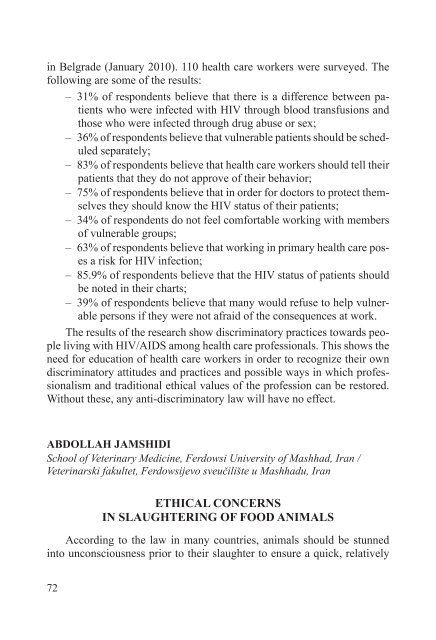Programska knjižnica 9. Lošinjskih dana bioetike - Hrvatsko ...
Programska knjižnica 9. Lošinjskih dana bioetike - Hrvatsko ...
Programska knjižnica 9. Lošinjskih dana bioetike - Hrvatsko ...
You also want an ePaper? Increase the reach of your titles
YUMPU automatically turns print PDFs into web optimized ePapers that Google loves.
in Belgrade (January 2010). 110 health care workers were surveyed. The<br />
following are some of the results:<br />
– 31% of respondents believe that there is a difference between patients<br />
who were infected with HIV through blood transfusions and<br />
those who were infected through drug abuse or sex;<br />
– 36% of respondents believe that vulnerable patients should be scheduled<br />
separately;<br />
– 83% of respondents believe that health care workers should tell their<br />
patients that they do not approve of their behavior;<br />
– 75% of respondents believe that in order for doctors to protect themselves<br />
they should know the HIV status of their patients;<br />
– 34% of respondents do not feel comfortable working with members<br />
of vulnerable groups;<br />
– 63% of respondents believe that working in primary health care poses<br />
a risk for HIV infection;<br />
– 85.9% of respondents believe that the HIV status of patients should<br />
be noted in their charts;<br />
– 39% of respondents believe that many would refuse to help vulnerable<br />
persons if they were not afraid of the consequences at work.<br />
The results of the research show discriminatory practices towards people<br />
living with HIV/AIDS among health care professionals. This shows the<br />
need for education of health care workers in order to recognize their own<br />
discriminatory attitudes and practices and possible ways in which professionalism<br />
and traditional ethical values of the profession can be restored.<br />
Without these, any anti-discriminatory law will have no effect.<br />
ABDOLLAH JAMSHIDI<br />
School of Veterinary Medicine, Ferdowsi University of Mashhad, Iran /<br />
Veterinarski fakultet, Ferdowsijevo sveučilište u Mashhadu, Iran<br />
ETHICAL CONCERNS<br />
IN SLAUGHTERING OF FOOD ANIMALS<br />
According to the law in many countries, animals should be stunned<br />
into unconsciousness prior to their slaughter to ensure a quick, relatively<br />
72

















